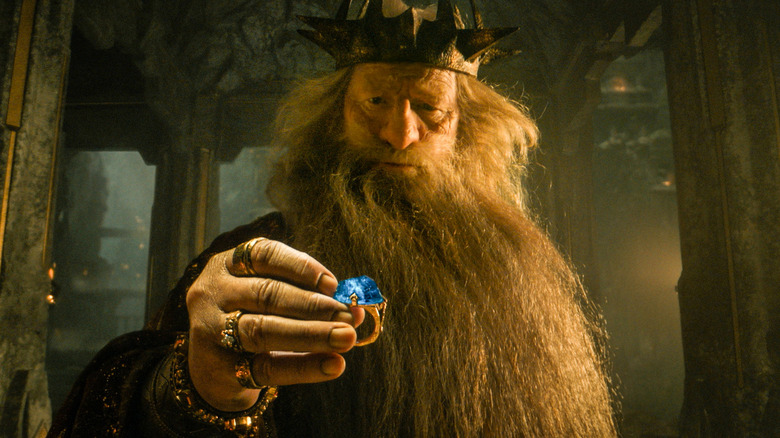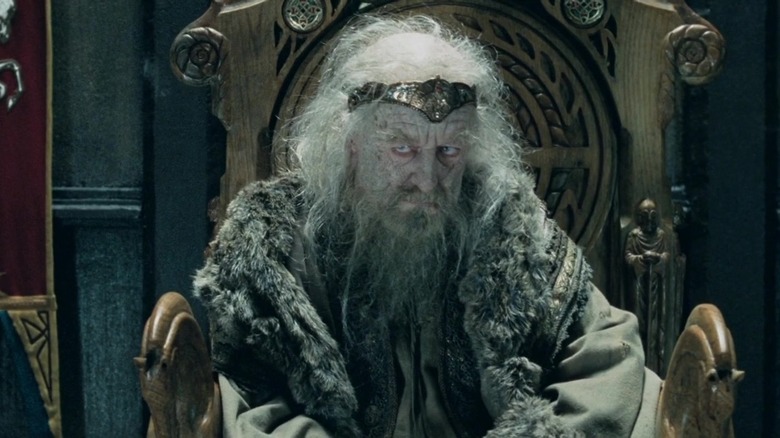The Rings Of Power Season 2 Features Lord Of The Rings' Favorite Daddy Issues
In a letter to his mother written on January 4, 1892, Arthur Tolkien broke the news that his wife had just given birth to their first son. "The baby is (of course) lovely. It has beautiful hands and ears (very long fingers), very light hair, 'Tolkien' eyes and very distinctly a 'Suffield' mouth," Arthur enthused. "In general effect immensely like a very fair edition of its Aunt Mabel Mitton."
The lovely baby was given the name John Ronald Reubel Tolkien, and some years later he used his very long fingers to write a fantasy novel called "The Hobbit" and its epic follow-up, "The Lord of the Rings." Now, 132 years after Arthur Tolkien wrote his letter, Amazon's spin-off TV series "The Lord of the Rings: The Rings of Power" is gearing up for the premiere of its second season — and a father and son relationship will be a key part of the story. Showrunners Patrick McKay and J.D. Payne offered Total Film some teases of what to expect from King Durin and Prince Durin in season 2:
"A recurring motif in mythology centres around a king's failing health leading to a sickness in the land that endangers the entire kingdom. Season 2 sees a fractured relationship between King Durin and his son take on a similar larger dimension. Just as the King has become deaf to the pains of his own son, the Dwarves have lost their ability to hear the mountain. This precarious position makes them ripe targets for Sauron's offer of Dwarven Rings as a panacea — but it all comes at a price: King Durin's sanity. As the ring stokes his greed, it drives the wedge between father and son deeper, ultimately bringing them to the brink of a split that may have greater consequences than any threat they have faced thus far [...]."
Father figures in the Lord of the Rings
Tolkien's relationship with his biological father was sadly short-lived. Arthur died when his eldest son was just four years old, and Tolkien's mother passed away when he was 12. That left him and his brother in the guardianship of Father Francis Xavier Morgan, who arranged for them to live with an aunt and then, when it was clear they were unhappy in her home, moved them into a boarding house next to his oratory. In a 1941 letter to his son, Michael, Tolkien described Father Francis as a man who "had been a father to me, more than most real fathers." That made it all the more painful when a rift formed between them. Father Francis learned of the teenage Tolkien's affection for Edith, a Protestant girl (and the future Mrs. Tolkien), and forbade any love affair between them until Tolkien was 21. The command kept him separated from Edith for three "extremely hard, painful, and bitter" years.
Frodo's childhood most strongly reflects Tolkien's own: he is orphaned at the age of 12 and lives briefly with relatives before being adopted by his kindly uncle, Bilbo Baggins. But McKay and Payne's description of Durin III's corruption by the ring particularly brings to mind two other fatherly figures: King Théoden, who is physically weakened by Gríma Wormtongue and made malicious towards the niece and nephew he adopted; and Denethor, whose sanity deteriorates dues to a palantír that shows him visions of Gondor's doom, leading him to nearly burn his son alive.
Whether these character dynamics were influenced by Tolkien's own life, or simply by the mythology that the "Rings of Power" showrunners reference, there's no denying that father-child rifts can create heartbreaking storylines. We'll find out if this one is a heartbreaker in "The Rings of Power" season 2, which premieres August 29 on Prime Video.

